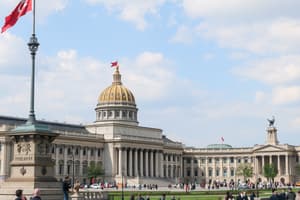Podcast
Questions and Answers
Analyzing the structure and operation of government bureaucracies to improve efficiency and accountability falls primarily under which subfield of political science?
Analyzing the structure and operation of government bureaucracies to improve efficiency and accountability falls primarily under which subfield of political science?
- Political Methodology
- Public Administration (correct)
- Comparative Politics
- Public Law
Which core concept of political science is best exemplified by a government's ability to enforce laws and policies within its borders without external interference?
Which core concept of political science is best exemplified by a government's ability to enforce laws and policies within its borders without external interference?
- Authority
- Sovereignty (correct)
- Legitimacy
- Power
A political scientist is conducting a study on the impact of social media on political campaigns. Which approach to studying political science would be most suitable for this research?
A political scientist is conducting a study on the impact of social media on political campaigns. Which approach to studying political science would be most suitable for this research?
- Institutionalism
- Interpretivism
- Positivism
- Behavioralism (correct)
A country transitioning from an authoritarian regime to a democratic system is MOST directly related to studies in which subfield?
A country transitioning from an authoritarian regime to a democratic system is MOST directly related to studies in which subfield?
Which of the following perspectives emphasizes the importance of understanding the underlying meanings, ideas, and context that shape political actions and institutions?
Which of the following perspectives emphasizes the importance of understanding the underlying meanings, ideas, and context that shape political actions and institutions?
A researcher aims to understand how different electoral systems affect voter turnout in various countries. Which political science subfield would be MOST relevant for this study?
A researcher aims to understand how different electoral systems affect voter turnout in various countries. Which political science subfield would be MOST relevant for this study?
Which political ideology is characterized by its advocacy for a classless society and the abolition of private property?
Which political ideology is characterized by its advocacy for a classless society and the abolition of private property?
What area of study within political science would MOST directly address treaties, diplomacy, alliances, and conflicts among countries?
What area of study within political science would MOST directly address treaties, diplomacy, alliances, and conflicts among countries?
Analyzing judicial review and its effects on civil rights and liberties falls MOST directly under which subfield of political science?
Analyzing judicial review and its effects on civil rights and liberties falls MOST directly under which subfield of political science?
Understanding the philosophical underpinnings of concepts such as justice, liberty, and equality falls under which subfield of political science?
Understanding the philosophical underpinnings of concepts such as justice, liberty, and equality falls under which subfield of political science?
Flashcards
Political Science
Political Science
The study of politics and power from various perspectives.
Sovereignty
Sovereignty
Supreme authority within a territory to make and enforce laws.
Democracy
Democracy
A system where citizens hold power, usually via elected officials.
Ideology
Ideology
Signup and view all the flashcards
Political Culture
Political Culture
Signup and view all the flashcards
Public Law
Public Law
Signup and view all the flashcards
Public Administration
Public Administration
Signup and view all the flashcards
Liberalism
Liberalism
Signup and view all the flashcards
Voting Behavior
Voting Behavior
Signup and view all the flashcards
Positivism
Positivism
Signup and view all the flashcards
Study Notes
- Political science is the study of politics and power from domestic, international, and comparative perspectives.
- It entails understanding political ideas, ideologies, institutions, policies, processes, and behavior, as well as groups, classes, government, diplomacy, law, strategy, and war.
- Political science is a social science that uses both humanistic and scientific perspectives and tools to examine a state and its organs.
- Traditional political science includes political philosophy, and modern political science includes behavioral approaches.
- Political scientists use quantitative and qualitative tools to analyze political phenomena.
Subfields
- Political theory studies the history of political thought and philosophical underpinnings of political concepts.
- Comparative politics compares domestic politics and governance across different countries.
- International relations examines the interactions between states and non-state actors in the global arena.
- Public law analyzes the role of law in politics, including constitutional law, administrative law, and international law.
- Public administration studies the implementation of public policy and the management of government bureaucracy.
- Political methodology deals with the different ways political scientists study politics.
Core Concepts
- State: A political entity with a defined territory, a permanent population, a government, and the capacity to enter into relations with other states.
- Sovereignty: The supreme authority within a territory, with the exclusive right to make and enforce laws.
- Government: The institutions and processes through which a state is ruled.
- Power: The ability to influence the behavior of others.
- Authority: The legitimate right to exercise power.
- Legitimacy: The belief that a ruler or institution has the right to govern.
- Democracy: A system of government in which the people hold power, typically through elected representatives.
- Authoritarianism: A system of government in which power is concentrated in the hands of a single leader or small group.
- Ideology: A set of beliefs and values about the ideal political order.
- Political culture: The shared values, beliefs, and attitudes about politics within a society.
- Public opinion: The attitudes and beliefs of the public on political issues.
Political Theory
- Explores fundamental questions about the nature of justice, liberty, equality, and the good society.
- Examines the history of political thought, from ancient Greece to the present.
- Engages with contemporary political issues, such as human rights, democracy, and environmentalism.
- Key thinkers include Plato, Aristotle, Machiavelli, Hobbes, Locke, Rousseau, Marx, and Mill.
- Major schools of thought include liberalism, conservatism, socialism, feminism, and critical theory.
Comparative Politics
- Compares and contrasts political systems across different countries.
- Seeks to identify patterns and generalizations about political behavior and institutions.
- Explores the causes and consequences of democracy, authoritarianism, and political instability.
- Examines the role of culture, economics, and social forces in shaping political outcomes.
- Common research methods include case studies, statistical analysis, and qualitative comparison.
International Relations
- Studies the interactions between states and non-state actors in the global arena.
- Focuses on issues such as war, peace, diplomacy, trade, and international organizations.
- Examines the causes and consequences of globalization.
- Seeks to understand the conditions for international cooperation and conflict.
- Major theories include realism, liberalism, constructivism, and Marxism.
Public Law
- Analyzes the role of law in politics and society.
- Examines the interpretation and application of constitutional law.
- Studies the relationship between law and political power.
- Focuses on issues such as civil rights, civil liberties, and judicial review.
- Explores the impact of law on social and economic outcomes.
Public Administration
- Studies the organization and management of government bureaucracy.
- Focuses on the implementation of public policy.
- Examines the role of public servants in shaping government decision-making.
- Explores issues such as accountability, efficiency, and effectiveness in government.
- Major topics include budgeting, human resources, and organizational behavior.
Political Methodology
- Deals with the methods and techniques used to study politics.
- Includes quantitative methods, such as statistical analysis and game theory.
- Includes qualitative methods, such as case studies and interviews.
- Focuses on issues of research design, data collection, and data analysis.
- Seeks to improve the rigor and validity of political science research.
Political Ideologies
- Liberalism emphasizes individual rights, limited government, and free markets.
- Conservatism emphasizes tradition, social order, and individual responsibility.
- Socialism emphasizes social equality, economic justice, and government intervention.
- Communism emphasizes a classless society, common ownership of the means of production, and the abolition of private property.
- Fascism emphasizes nationalism, authoritarianism, and the suppression of dissent.
- Anarchism advocates for the abolition of the state and hierarchical social structures.
Political Behavior
- Voting behavior involves motivations and patterns behind citizens' choices in elections.
- Public opinion is the aggregation of individual attitudes and beliefs about political issues.
- Political participation includes various activities citizens engage in to influence government.
- Social movements are collective efforts to promote or resist social and political change.
- Interest groups are organized groups that seek to influence government policy.
Approaches to Studying Political Science
- Positivism seeks to explain political phenomena through objective observation and empirical analysis.
- Interpretivism emphasizes the importance of understanding the meaning and context of political action.
- Rational choice theory assumes that individuals are rational actors who seek to maximize their self-interest.
- Behavioralism focuses on the observable behavior of individuals and groups in political settings.
- Institutionalism emphasizes the role of institutions in shaping political behavior and outcomes.
- Critical theory seeks to challenge existing power structures and promote social justice.
Current Trends in Political Science
- Globalization is reshaping the international system and the domestic politics of states.
- Democratization is spreading in many parts of the world, but also facing challenges and setbacks.
- Political polarization is increasing in many countries, leading to greater division and conflict.
- Populism is on the rise, challenging traditional political establishments and institutions.
- Digital technology is transforming political communication, mobilization, and governance.
Studying That Suits You
Use AI to generate personalized quizzes and flashcards to suit your learning preferences.




